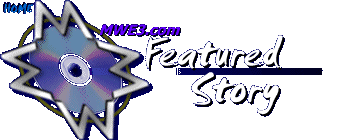DUANE
EDDY
Dance
With The Guitar Man
by Robert Silverstein
Fifty years ago, Duane Eddy started the twang that was heard around
the world. The January 1958 release of “Rebel Rouser” -
the first of many Duane Eddy / Lee Hazlewood productions that followed
- ushered in the rock and roll instrumental genre. Others followed
including legends like Link Wray, Dick Dale, The Ventures and in England,
The Shadows furthered the sound set in motion by Duane Eddy. Rock
and Rollers swear by him and the list of guitarists who’ve paid
homage to Eddy over the years include George Harrison, Jeff Lynne,
Hank Marvin, John Fogerty, Bruce Springsteen, Brian Setzer and countless
others. Following his initial rock and roll breakthroughs in the late
‘50s and early ‘60s, Eddy remained on the scene, albeit
in a more refined, cult status way until he was lured back out on
the scene in 1987 by Harrison and Lynne. Now age 67, Eddy is promising
yet another comeback with a planned 2008 album of instrumental and
vocal tracks. It’s not often you get to speak with the man who
pioneered the rock and roll instrumental genre and for his interview
with Robert Silverstein on November 15th, 2007 Duane spoke in measured
detail on a range of subjects including the late Lee Hazlewood, recording
with George Harrison and Hank Marvin as well as his third signature
guitar, his Gibson Duane Eddy Signature model.
RS: Duane, great to speak with you...how’s things in Nashville?
DE: Everything is fine in Nashville. Turning a little cold today but
other than that everything’s great.
RS: What do you like best about Nashville?
DE: I love it here. Sort of the last bastion of live music. I know
in California and L.A. there’s just not a lot of people who get
together and do live sessions like there are here. I don’t think
there is, I don't know for sure, I may be wrong but there’s not
a lot of it in New York either. But I do know, there’s still
a lot of it happening here. A lot of great musicians living within
the area and great studios. You can do any kind of music you want.
Of course the mainstay is country here in this town but there’s
also a lot of other things that come out of here.
RS: Tommy Emmanuel and John Jorgenson told me they love Nashville.
DE: Yeah, well everybody loves them here! (laughter) A great audience,
not only the public here, the folks out there, but the musicians all
love those guys.
RS: And they all have great things to say about you. You recently
worked on Muriel Anderson’s new CD? What was it like recording
on Muriel’s “Wildcat” song?
DE: Well, it was fun. It’s not something I usually do. It kind
of had a little jazz flavor, and I’m really a jazz player as
such. But I kind of get a few licks and it was fun!
RS: I didn’t know she was also a great singer too.
DE: I know! That was a surprise, wasn’t it? She’s a really
good little singer! And she really did a great job on that album.
RS: I hear you’re recently recording.
DE: I am. I’m working with a young genius producer down here
in Nashville named Monroe Jones. He’s done some pop artists but
he’s also done a lot of Christian artists, the contemporary Christian
stuff and he’s sold millions of records in that genre. He’s
just a great musician, a great producer. And I think he’s about
ready to burst wide open on the music scene in a big way. Even bigger.
Of course, the Christian world knows him very well. He’s just
a really fantastic producer. And he gets my sound better than anybody
has since the original days. Back when I started. So, I’m really
looking forward to people hearing some of this stuff that we’re
working on. We’re working on some instrumentals, of course. But
I’ve also got a song I wrote with Mentor Williams called, “That’s
How It Was When We Started To Rock & Roll”. It has some lyrics
to it and I did that with Brian Setzer. He sang the lyrics and we
both blaze away at each other with our guitars. It’s an old time
rock and roll thing, like we did back in the ‘50s. It’s
just fun. Another track I did was song I wrote with Phil Everly and
Suzanne Hicks, who’s a local writer here. The three of us wrote
this song and Phil sang it and I played it and it’s turned out
to be a very pretty record. So, just some interesting folks on it.
RS: Is that a planned release?
DE: Well, we’re putting the album together right now, a little
bit at a time and plan to have it finished by sometime in the Spring.
RS: I don’t know Mentor...
DE: Mentor Williams. He wrote “Drift Away” for Dobie Gray
years ago and he’s Paul Williams brother as well, who’s
a great songwriter. But Mentor’s a great songwriter on his own.
He’s written some big hits.
RS: Next year is the 50th anniversary of “Rebel Rouser”.
The song still sounds great.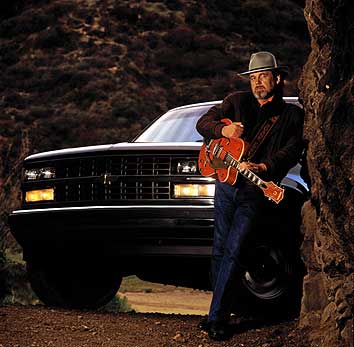
DE: Thank you, thank you. I still enjoy playing that old song. Always
have. It’s great fun. I don’t know what we’re going
to do. We’re talking about it but we haven’t come up with
any definite plans yet as to what we’re going to do. We’re
talking about maybe doing a concert somewhere and filming it and having
a 50th anniversary show.
RS: Is Jamie Records putting out anything new? Are they still in business?
I know they’ve been back in business for a while. They also recently
reissued, $1,000,000 Worth Of Twang on CD.
DE: No, I don’t know anything about what they’re doing these
days. They don’t pay me for my royalties and I never hear from
them. So, I don’t know what they’re up to. I do know they
keep releasing things periodically. And that’s all I know. I
know as much as you do, which is not much (laughter) about that...
RS: Do you still own the rights to your masters.
DE: No, I wish I did. And it’s time I did, but I don’t.
So they own everything. That’s just the way it was in the ‘50s.
Who knew? It was a whole new business. I was a young kid, 19. And
they knew what they were doing and I didn’t. And the lawyers,
the managers and the record companies were all in it together in those
days. So the artists didn’t really stand a chance and most of
us got ripped off pretty badly. But that’s another story for
another day. (laughter) Don’t want to be gloomy on ya.
RS: I just heard a great new reissue from England on the GottDiscs
label of Twenty Terrific Twangies / Water Skiing. I know Water
Skiing came out in 1964 on RCA and TTT came out on RCA
in England in 1980.
DE: Yeah, these are mostly fans I think that get together and go to
the record companies and talk ‘em into rereleasing this stuff
and just put it together however they want to hear it. And for some
reason the record companies go along with it. There’s these little
labels and they keep releasing things so I must still selling some
albums otherwise they wouldn’t keep doing it.
RS: I’d never heard the Water Skiing album...
DE: Not many people did Robert! (laughter) That was one of those ideas
that seemed like a good idea at the time. It was like 1963 and ‘64
and there was surf music going on. And I thought, the middle of country,
the rest of us don’t live by the ocean can’t go surfing
so... But they can go water skiing. So maybe some water skiing music
would be good, but it was the worst selling album I ever had. (laughter)
RS: It was kind of a concept album on water skiing, in a light hearted
way.
DE: It was good fun to do and I thought it might be a good idea. I
could picture all the kids up in the Midwest buying it and playing
it while they’re water skiing. It didn’t catch on.
RS: On the Water Skiing cover art you’re actually skiing.
DE: It was January in Long Beach harbor and the photographer was standing
on the bank on the bay there with an overcoat on. (laughter) And I
did like a dock start off the front of another boat. ‘Cause I
wasn’t about to do a deep water start and get in that cold water
which was like 58 degrees. So I just started off the front of the
boat and stayed up all the way around about two or three times. Waved
at ‘em a few times and they kept shooting every time I’d
go by with their cameras. Finally at about the third time around I
just steered over near the bank which was all big boulders and rocks
and let go of the rope at the last minute and sunk down and climbed
out on the rocks and they threw a towel around me and an overcoat
(laughter). I was freezing. That spray was starting to freeze my legs.
It’s just funny thing now, we all got a big kick out of it.
RS: Also from the Water Skiing album was that the song “The
Backward Swan” That song was written by Al Casey’s wife?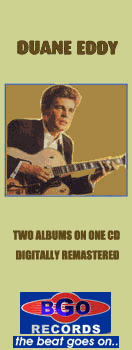
DE: Corkie, was it? She might have given me the idea for it. Did I
co-write it? I don’t remember. It might have been Al Casey that
co-wrote it with me. We wrote a few songs together. Like “40
Miles Of Bad Road.” He and I wrote that at a session on day.
He wrote “Ramrod” and a couple of the album cuts along the
way too, he co-wrote with me.
RS: You guys made such a great team together.
DE: I always had great musicians. Steve Douglas on sax and then Jim
Horn on sax. Larry Knechtel on keyboards. They’re all giants
in their world, in the side man worlds. Larry Knechtel went on become
a great bass player. Besides winning a grammy for arranging “Bridge
Over Troubled Waters” for Simon & Garfunkel and playing that
great piano intro, he also played bass on the Byrds records “Mr.
Tambourine Man” and “Turn Turn, Turn.” Very innovative
bass runs that he did. And then he joined Bread! David Gates’
group. Became a member of Bread for several years after 1970 through
their big hit period. And played guitar on Bread’s version of
“Guitar Man.” (laughter) They couldn’t find the right
solo. David was trying to and he went through a number of guitar players
and it still wasn’t right. And Larry finally was tired sitting
around waiting for it to get right so he says, ‘Can I try it?’
(laughter) And David said, ‘well sure go ahead.’ On the
first take David said, ‘I think that’s it but let’s
do another one just to make sure.’ But they took the first one
and that was it. That’s the solo you hear on the record.
RS: I heard something from Larry that he made in the ‘80s, a
New Age kind of CD when CD first started.
DE: Yeah...and he’s the only guy I knew who played four different
instruments on hit records, guitar, bass and keyboards of course.
He played keyboards and bass on hundreds of sessions back in the ‘60s,
all through the ‘60s. I mean big hit records that you would know.
And the same with Jim Horn and Steve Douglas, they did a lot of that.
They’re all part of the wrecking crew. Hal Blaine and everybody.
They’re fantastic musicians.
RS: Jim Horn asked you to play on “We Can Work It Out” from
Jim’s solo album then.
DE: He called up and asked if I’d put a guitar on one thing.
Of course, he played on enough of mine, I’m happy to play on
one of his. (laughter) I also did one track on his Christmas album.
RS: Getting back to the Twenty Terrific Twangies / Water Skiing
reissue can you recall making Twenty Terrific Twangies?
DE: Yes I do. It was a collection. A lot of things were either b-sides
or singles that nobody paid attention to. And there were a few things
on there like “Sunday Morning Rain” that had never been
released before. I had done endless saving for something or other
and after I left RCA they were still there. I never got around to
putting them on something, on an album or anything. So they were still
there. A lot of them had never been heard before.
RS: It’s funny that Twenty Terrific Twangies has a version
of “The Backward Swan” and it reappears again on the CD
as track 24. I haven’t checked to compare the mixes to hear if
they’re the same.
DE: They would be. I only did one master. There again, it was another
fan over there in England. I know the guy. He just went to BMG or
RCA over there in England and talked them into putting this collection
together and putting it out.
RS: Have you seen it?
DE: I got one! (laughter) I think it was the head of the fan club
that sent me a copy of it finally. They kind of ignore me because
they figure they figure they know better about me than I know about
me so, they don’t want to hear any criticism. They just go ahead
and do this stuff and then tell me about or I hear about it from other
sources. It’s a very strange life I live...(laughter) musically
speaking.
RS: Was there a lot of attention paid to different mixes back then?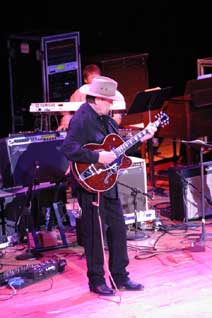
DE: No, we had one mix Robert and that was it. Well, we had two actually.
We had mono and stereo. After I started doing stereo, and I was one
of the first to do that in rock and roll. My first album was part
stereo. Have Twangy Guitar Will Travel. We had about three
fourths of it in stereo. And of course half of it was hits, and some
of those hits...”Cannonball” was in stereo and that was
a hit. But “Rebel Rouser” was only in mono so it never was
in stereo. But the rest of the album was, except four tracks, and
the other eight were stereo. But that’s the only mixes we did.
We did one mix and then once in stereo and then once in mono. And
that was it.
RS: : Did you have a preference for mono versus stereo?
DE: Yes I do. A lot of that early stuff, the best way to hear it is
in mono and the best way to hear it the best way is on AM radio in
mono. It’s mixed for AM radio! And that where it really sounds
the best of the best. I’ve always liked mono. I like stereo though
too. Now, when I met Elvis Presley in 1971 one of the first things
we talked about, he said, ‘You know, I still like mono better
then stereo,’ and I said, ‘Really? I like stereo all right.’
He says, ‘Yeah, but the mono mix, it comes out of the speaker
and just bang! Hits your right in the chest.’ And he’s not
wrong. It’s just much more powerful. And it is. The mono mixes.
The whole record is all right in your face, much more then stereo
is just kind of spread out like you’d see a band on stage.
RS: Your producer and co-writer, the great Lee Hazelwood passed away
last August. How key was Lee to your early success and what was it
like working with Lee during the early years. You also played on his
last Cake Or Death album on a cover of “Boots”? Was
that an instrumental of the song he wrote for Nancy Sinatra?
DE: Well we started out just being friends. He came to Coolidge Arizona
where I was finishing up high school and he came and had his first
job as a disc jockey at the local radio station there. A friend of
mine took me out to the transmitter and met him one time. A friend
of mine who wanted to be a DJ and was hanging around out there and
had met Lee, and says, ‘You need to meet this guy, he’s
really funny.’ So I went out with him one night and met Lee and
got to talking. I used to sing with another kid there in Coolidge,
Jimmy Dell. And we sang uptempo country. I’d sing lead and he’d
sing harmony. We were doing rockabilly but we didn’t know it.
It was before Jerry Lee and Elvis and everything else We’re talking
1953, ‘54. So Lee got all interested in us. He thought we were
good. And he took us to Phoenix to the talent show up there. He signed
us on and we went up every week. We thought it was good for Lee because
he wanted to get a job in a bigger market, which was Phoenix. So one
thing and another and couple years later Lee produced his first record,
well his second actually. He produced a record with Jimmy Nye, but
that never came out. That was his, that was his first attempt at writing
and producing. We never got a deal for it. So his second attempt was
with Sanford Clark, “The Fool.” And that became a top ten
record in the pop charts. Then he didn’t get anything for a couple
years and in ‘58, late ‘57 we cut “Moovin’ N'
Groovin’” It came out in January ‘58 and got to number
70, then dropped out of the charts. That was enough to encourage us
to go back in do some more tracks. So went back in and among those
tracks, one morning I wrote “Rebel Rouser.” Then we finished
it up, mixed it and everything. And we put it out and it was a huge
hit that summer of ‘58. We were co-writing on everything. Sometimes,
like “Rebel Rouser,” I came up with the melody and everything.
What he did with that were the sharps and the background singers and
the yells and mixing and all that. I always felt it was worth more
than half the song. (laughter) It certainly was worth half the song.
So we always split the writers. I came up with my idea of doing the
bass strings and all that ‘cause I’d done a few sessions
in Phoenix and discovered in the process that the bass strings were
more powerful. And also I know we needed a melody or a really strong
riff of some kind, so we took that premise and went with it. I knew
I needed my own style. I learned that from the country people. Have
your own style, your own sound and do it with authority. (laughter)
So, I did those things and Lee got it on the tape and messed with
the sound to where it was really good. ‘Cause he’d sit there
all that time listening to those records while he was playing ‘em
as a DJ and dissecting them in his ears. So he knew what kind of sound
he wanted on the bass and the drums and so forth. He really did a
great job of putting those records together.
RS: It’s amazing that you and Lee had the first guitar instrumental
hits. You were the first one to...
DE: There were two. There was Bill Doggett had “Honky Tonk”
in ‘56 and Bill Justice had “Raunchy” (and Ernie Freeman
had it on the West Coast) in the late summer of ‘57. Which is
why Lee said, ‘Well, let’s us try an instrumental. Go an
write and something.’ So I went home and wrote “Moovin’
N' Groovin”. It worked out well. Even better ‘cause we were
good friends, so we had good fun couple of years, then he quit and
started doing other things. Anyway we worked on and off for several
years. When I went to RCA he came back for a year and then did a couple
projects on Reprise and Colpix. So it was in and out up until the
late ‘60s. Then I didn’t work with him. I worked with him
on his project, his last album. I played on one track, produced it.
RS: Was that an instrumental of “Boots”?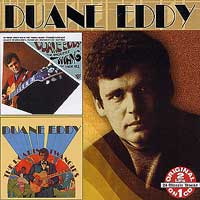
DE: No, he sang it. What happened he came by and sang this other melody
that he said said he’d thought of having back in the old days.
He kind of worked it off of the bass lick on his hit record of “Boots”
with Nancy. You know how the bass starts off, (sings the bass line
intro of “These Boots Are Made For Walking”) The quarter
note thing? He sang it like that. I said, ‘That sounds cool,
you just make a demo of it and get a jazz singer to do it.’ So
he said, ‘that’s kind of an idea.’ So a couple years
later when he was doing his last album why he said, ‘remember
when I did that for you and you said what I should do, why don’t
we do that for my album. We’ll do your idea.’ And I said,
‘okay.’ So I put it together and he came down to Nashville,
we hired the musicians, I set up the session and called Richard Bennett,
a friend of mine who’s also from Phoenix and a great guitar player
and producer. Anyway, Richard and I got the guys together and we went
in the studio. Lee came into town and we did the track. And he sang
it. He called the album Cake Or Death. (laughter)
RS: After your move from Jamie Records to RCA Records was there a
change in direction.
DE: The thing is with RCA, you had to plan... I was used to cutting
a record one week and it’d be out the next. And we stayed right
on top of the cutting edge of current things. But when I went to RCA,
I started cutting in February and they had no plans to release it
till August. So, I did a Twist album with them first, ‘cause
that was really big at the time but by the time August came it wasn’t
such a big trend anymore. And the album did okay, but I was just kind
of behind the curve, I felt. So I went ahead and did some string albums
with Marty Page and Bob Thompson and got Lee involved again for about
a year and we came up with “Dance With The Guitar Man” and
“Boss Guitar” and did the “Ballad Of Paladin.”
It wasn’t current stuff, well “Boss Guitar” and “Dance
With The Guitar Man” was new again. It was okay if it came out
later ‘cause nobody heard it anyway yet. You couldn’t stay
with the trend at that point.
RS: A lot of your early CD reissues are getting big money and I know
you also worked with Bear Family on a box set...
DE: No, I didn’t work with them on that. Again, that was some
fans who got it all wrong. The Bear Family thing is mastered badly,
poorly and the booklet that comes with it is complete fiction. Lee
and I sat here and read it one day and those were his words. He says
‘this is total fiction.’ And I said, ‘Yeah, I know.’
I don’t know who wrote it, I don’t pay any attention. But
it’s just a bunch of stories and lies. They’re not even
close to being truth. But there is a package, Robert, that’s
really good, that’s taken some time. I was involved with it,
in the remastering of it. It was on Rhino and it’s called Twang
Thang: Duane Eddy Anthology. And I got to remaster it, Lee heard
it and he thought I did a good job and that pleased me. I played him
some of the tracks from it and he said, ‘oh yeah, that’s
fine, that’s great.’ And also Dan Ford, who’s a writer
for Guitar Player and Vintage Guitar. He just freelances but he’s
been doing stories on guitar players for years. He came and stayed
with me for two or three days, sat and asked questions and recorded
the answers and then went home and wrote the booklet for it. So the
stories are accurate in that. And we gave him a bunch of old pictures
so it’s a good package, but the Bear Family is just pure fiction
and it’s mastered very poorly.
RS: The Rhino package came out in ‘93. It would be real interesting
to see your stuff remastered like the Beatles American album reissue
set, which came out with mini LP jacket style packaging with stereo
and mono versions of the albums. Is that a possibility with your stuff?
DE: Ahh...not that I know of. Anything’s possible. Are you talking
about with the RCA stuff? No...for some reason they don’t ever
want to talk to the artist about that. I mean, they have to with the
Beatles because The Beatles ended up, I think, owning most of their
stuff again, or owning a big portion of it. And they also had good
management...well not too great when they started because, Brian made
a deal where they’d only get royalties for 25 years. Nobody could
envision anything selling 25 years from now in those days. So, 25
years came and Capitol said, ‘well we don’t owe you any
more royalties.’ Well, the law suits were on and The Beatles
won, so they get their royalties and probably a lot more. Which is
only as it should be. It’s not like the record companies are
suffering. Or suffered with the Beatles stuff or my stuff or anybody's.
RS: I’m also a big fan of your Ghostrider CD that came
out on Curb in the mid ‘90s. Any memories of making Ghostrider?
Seemed like there was a lot of songs that you remade for the Ghostrider
album...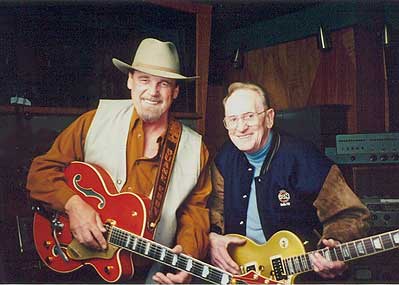
DE: I thought he wanted me to do an album, a proper album. You know,
new songs and everything and that’s what he said, Mike Curb.
And I said, ‘Sure, I’d love to do that. Great.’ And
so I signed up and everything and then he says, ‘Well actually
I want you to do just a couple of the old ones so I’ll have something
to sell it with.' And I said, ‘well...okay.’ So I did a
couple of them and then he said, ‘well I really need about four
or five,’ and actually kept going and going. So I said, ‘oh,
I see where this is going.’ He didn’t want a new album at
all. So I got about two or three new songs in there and reworked an
old one that I liked called “The Avenger” and kind of changed
that around a little bit. But it was still all old stuff basically.
So I did “Ghost Riders In The Sky”. I’ve always wanted
to do it, my version of it. So I just did it, ‘cause it’s
from that same era. Fits in with the idea of doing the old stuff.
“Dreams Of Home” was new and “Sidewinder” was
new. There’s a couple, three tracks in there that were new but
everything else was pretty much a rehash of the old stuff. New recordings
of it. They never did work on it really. He just wanted to have a
catalog thing but that was back in ‘95 when digital wasn’t
together yet. So we tried the first session in digital and it just
was one big jangle. So I went in the next day prepared to fight to
the death if need be. And Bob Gaudio was the producer. And I walked
up to Bob, I said, ‘Look. The session yesterday is a wash. I
said it’s a waste. But we can’t use it because it’s
all on digital. It’s all digital. We need to start over and we
need to do it analog.’ I thought, ‘oh, now the fireworks
will start.’ And he just kind of looked up from what he was doing
and he says, ‘Okay.’ (laughter) We switched over to analog
and did it but he failed to mention that to Mike Curb so when I told
Mike-because Mike was saying, ‘Great, I’ve got all of Duane
Eddy’s hits all re-cut in digital.’ I said, ‘They’re
not cut in digital, they’re analog.’ And he was a little
upset about that. I said, ‘well, they’re mastered in digital.
So you can say that.’
RS: Having Bob Gaudio as a producer isn’t too bad. He was one
of the founders of The 4 Seasons, right?
DE: Yeah. I knew him back when he was with The Royal Teens. (laughter).
(sings) Who wears, Short shorts? That’s probably way before
your time.
RS: The first record I ever bought was “Who Put The Bomp”
by Barry Mann back in 1961.
RS: Okay. Well then you probably heard The Royal Teens. That was about
‘58 or ‘59.
RS: Speaking of anniversaries, your 1987 CD, Duane Eddy on
Capitol (ST-12567) album is celebrating it’s 20th anniversary.
I see that album is selling for $50 used on Amazon. Isn’t it
about time to give that one a proper reissue? I heard it was recently
made available for download on iTunes too?
DE: Some company in England put it out too but again, they remastered
it kind of, they didn’t do a bad job but they lost a lot of the
power of it. Didn’t do a good job either. Or a great job. It
was adequate but it doesn’t sound as good as the original on
Capitol that I mastered at Futurdisc. That whole project was...what
I’d say about that was it wasn’t as much a project as it
was an adventure. (laughter) Going to England, working with George
Harrison. Went to his house, he had his studio there. Working with
him and Jeff Lynne. And then going down to Paul McCartney’s studio
and working with him. And coming back and doing some things...working
with Ry Cooder on a couple tracks. Finishing up doing a couple tracks
on my own and John Fogerty dropped by and played a solo on one. Had
James Burton of course. Larry Knechtel and Jim Horn. And it was just
a real adventure...the whole thing. Great fun.
RS: One of my favorite instrumentals of yours is a song from that
1987 Capitol record called “Theme For Something Important”
- that was produced by Jeff Lynne and George Harrison plays some great
slide on that song.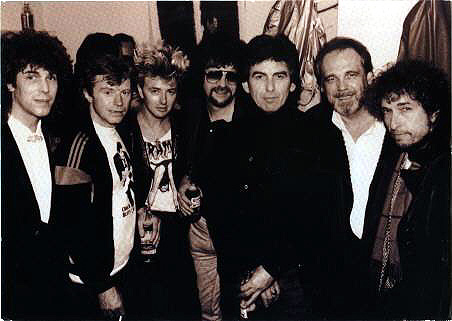
DE: He did! He and Jeff went in one day while I was gone somewhere
and I came back and they said, ‘Listen to this,’ and I said,
‘Oh my goodness.’ ‘Cause I knew what it was soon as
I heard it. I looked over at George and he just smiled and I said,
‘That is cool! Thank you for putting it on there.’ We just
had a lot of fun. George was very sweet. ‘Cause he was doing
Cloud 9 at the time, his album. And I had seen Jeff Lynne,
ran into him and he says, ‘I know you’re going to be doing
an album here,’ ‘cause I’d had the hit with The Art
Of Noise doing “Peter Gunn.” And they, (Art Of Noise) did
a couple tracks on the album too. But anyway, I had that hit and he
says, ‘I know you’re going to be doing an album because
of this hit. I’ll do anything you want. Produce, write, play,
whatever you want. I’d love to be a part of it.’ I said
‘Okay, I’ll call you.’ So I called him when I got the
album deal with Capitol. He said, ‘Darn it. I know I said that
but right now I’m busy producing George Harrison’s new album.’
I said, ‘Okay fine.’ I hung up. (I thought) ‘Okay,
fine. Things happen that way. I understand that.’ Well the phone
rang about ten minutes later. It was Jeff. He says, ‘Well I mentioned
it to George and George said he wanted to put his album on hold and
do a couple tracks with you.' (laughter) I said, ‘Okay! I’m
there!’ So I went over to England and we did it and it was just
great. George was a prince and a wonderful guy. Had a lot of laughs
and a lot of good meals and a lot of fun and some good music. As for
“Theme For Something Important,” Jeff and I put that together.
We were thinking of a name and George had put the slide on it and
he said (copying George’s accent) ‘Well it sounds like a
theme from something really important.’ (laughter) He says, ‘It’s
so big it should be called “Australia” or “Southwest”
or something.' (laughter) I said, ‘Yeah, I understand what you’re
saying. But I said, that’d make a good title right there...the
theme for something important.' So that’s what it ended up being.
RS: It’s a classic song. It really captured the best of your
sound with that whole Cloud 9 period, which was George’s
sort of coming back after the early ‘80s period.
DE: That and the other thing he came up with. He hummed me this little
melody. He said, ‘Ravi Shankar taught me this little melody I
think is quite good.’ And so I did “The Trembler,”
which he named. George named it “The Trembler.” And so I
wrote the bridge for it and he said, ‘This is great. I have a
song written by Ravi Shankar and Duane Eddy!’ (laughter) Two
of his heroes. He found that very humorous and quite amazing and pleasing
to himself.
RS: I know you also played on Hank Marvin’s 1991 Into The
Light album on a remake of “Pipeline” What was it like
working with Hank and how far back does your relationship with Hank
go? I was always amazed that The Shadows never became famous in the
US. Any chance of working with Hank on something in the future? I
know he’s very into this Gypsy jazz thing. His son Ben is a great
guitarist and, you know Dick Plant too?
DE: Yes, went to...I’m trying to think who was it who produced
it. One of the other Shadows...Brian Bennett and his son were working
on it at their home in England at their own private studio there.
So I went there and Hank was there and I put my guitar on it and Hank
was a peach. He was just great. It was fun working with him. Our paths
had crossed. We got to say hello once in a while but that was it.
I met him first in 1960. Cliff Richard and The Shadows came backstage
at one of our shows when I first came to England in 1960 with Bobby
Darin and Clyde McPhatter. We did a tour there. And about the second
night we were there, I think it was...somebody said, ‘Cause Cliff
had a couple of hits at that time. I think he had his first one in
1959, which incidentally was the year I had a hit with “Peter
Gunn.” And in 1987 he put the same song out again and it was
a hit at the same time as The Art Of Noise and I had “Peter Gunn.”
(laughter) That was an interesting little...I can’t remember
the name of the song. His first big hit. “Movin’ It”
or “Move It.” Something like that. Anyway, I met The Shadows
that night briefly and then I saw them on a TV show one time and Hank
and I stood there while they took pictures of us. And we went our
separate ways. We didn’t get to talk much. Another time I saw
them backstage somewhere. That was it. But when we got together at
Brian’s studio it was good fun. We had time to sit down and talk.
He was very sweet and he’s a great guitar player.
RS: I was always amazed that The Shadows never had a big hit here.
Maybe ‘cause The Beatles came so quickly after that whole...
DE: No. Something’s don’t translate. Cliff never had a hit
here and he was the biggest thing in England. Well, he had one hit
here. One or two that did fairly well. Something’s don’t
translate. They just don’t cross the water for some reason and
The Shadows were one of those. They were great records but maybe a
little subtle for America...I don’t know.
RS: Back in 1963, The Shadows had a huge hit with a song you and Lee
Hazelwood wrote called “Shazam” - There must be a memorable
story behind writing and recording “Shazam” with Lee and
were you surprised The Shadows had such a huge hit with the song?
DE: Yeah it did really well. I already had a hit with that in 1960.
All over the world. Lee and I wrote it and recorded it in Phoenix
for Jamie. And I also did it in the Dick Clark movie Because They’re
Young, which I did the theme song for, recorded that both in the
movie and on the record. And in fact it was my highest charting record,
“Because They’re Young,” in 1960. But in the movie
itself, I did “Shazam” on stage at a high school hop type
of thing in the movie. And it was a big hit here and around the world.
Of course The Shadows heard it in England when it was a hit there
and they covered it for their ‘62 or ‘63 album I think it
was and had another pretty good chart record with it then, as a single.
RS: : You didn’t get enough credit for that song. Looking back
on it, “Shazam” really has your signature sound on it.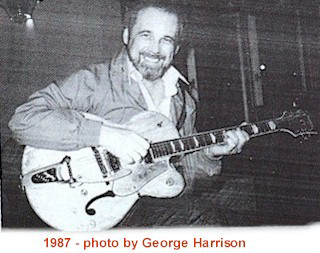
DE: Well, I did at the time. You just weren’t around to get the
impact. But at the time it definitely did have an impact at the time.
When it came out, I got a lot of credit. It was one of my hits. Of
my records, it was one of George Harrison’s favorites. ‘Cause
we talked about that one day when we were sitting in the studio and
they were looking at my guitar and everything. George was playing
on it and he played a little “Shazam,” and said, ‘That
was one of my favorites,’ and Jeff said, ‘Yeah “Dance
With The Guitar Man” was mine.’ So I don’t quite know
what you mean about not getting the credit.
RS: Do you think you’ll ever work with Hank in the future?
DE: Well, I sure wouldn’t say no. Anything is possible. But neither
one of us is exactly hot right now to where we could go out and get
deal to do something like that. Maybe I’ll run into him before
I finish my new album next year and we’ll do something.
RS: It would be great to have two of the greatest guitar instrumental
guys on record again....
DE: Well I kind of think he feels we did that with “Pipeline”
on his album so...
RS: Speaking of things related to The Shadows you also play on a track
on Cliff Richard’s 2007 album on a track. Is that true?
DE: That’s true and Monroe Jones, my producer here. Did I mention
him earlier? He’s a young genius, one of these up and coming
producers that are about to break loose and become very successful.
He’s got several projects that he’s working on. They’re
all great and one of them he’s doing is mine and I hope it’s
hugely successful. But anyway, Monroe was doing a couple tracks with
Cliff Richard and the album. That’s how Monroe and I met. He
didn’t even know I lived here in town and then he read about
it in the papers so he had his assistant see if she if could find
me and she did. She looked it up and found me and called up and asked
if I would be interested in playing on a Cliff Richard record. I said,
‘Well of course I would be.’ And so we set it up and I went
over there. They the sent me the thing and I went over to overdub
my part. That’s the way they do it these days, nothing’s
ever done all at once anymore. Not very much anyway. And they’d
already done the track but he wanted that kind of guitar on there.
So I went over and then Cliff showed up! Himself. Which was very nice.
So we talked and I put my guitar on and he was happy. I couldn’t
believe how great he sang on this track that I was working on, and
told him so. ‘Cause he was 64 at the time, he sounded like he
was 24. I thought it was the best track on the album myself, so did
several of the other producers. When they heard it, they applauded.
They all got together, all the producers and Cliff, all the engineers...and
they played the whole album together to check it out. After Monroe’s
track, the one I did, called “For Life,” everybody applauded.
(laughter) They thought the mix and the record in it’s entirety
just really was good. But nothing ever came of it. I saw Cliff doing
it live somewhere on a You Tube thing, but they didn’t release
it as a single, which I thought they should have and so did his fan
club. But the record company apparently, or Cliff, didn’t want
to.
RS: So the name of the song you did with Cliff is called “For
Life”?
DE: Yes, “For Life.” It would make a great wedding song
actually. And if it had been released as a single, it might have got
well enough known to where a lot of people would be doing that but
who am I? I’m just a artist, just a guitar picker. I don’t
really know why they make the decisions they make.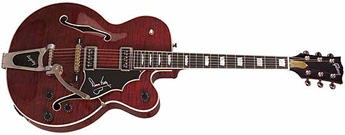
RS: Can you tell us the story behind your 2004 Gibson Duane Eddy Signature
and how closely did you work with Gibson on the reissue?
DE: Well, let me tell you about that! There’s a luthier at Gibson
named Mike McGuire. Now, I’ve known Mike for 30 years now, since
he had a music store store in Studio City, California, up in North
Hollywood there. And we became good friends and he started making
a guitar called the Valley Arts, named after his music store in Studio
City. And it became one of the top guitars and then he got involved
with a Korean company and they kind of took it over and as happens
so often, why he got aced out. So he came back here and went to work
for Gibson. So he always wanted to build me a guitar and he grew up
being a fan of mine. When we became friends, it was even more closer
to his heart to build a Duane Eddy guitar. So, I was with Gretsch
in the ‘90s and they sold out to Fender. And so I told Mr. Gretsch,
Fred Gretsch, ‘I think we should part company. I’m not happy.
Nobody told me this was happening. I don’t know if I want to
be with Fender.' And this, and that and the other, so we just parted
company amicably. And they stopped making the Gretsch Duane Eddy model.
Well Henry heard about that, at Gibson, you know Henry Juszkiewicz,
and asked if I’d like to be with Gibson. I said, ‘I’ll
give it a shot, I’ll give it a try.’ So, we drew up a contract
and I signed it and Mike McGuire got to make me the Duane Eddy guitar
the way he wanted to for several years and also the way I wanted.
The only thing different basically about it, is it’s got another
pickup in the bridge, that I’ve never had before. We still use
the same kind of single coil pickups so I can get my sound and it’s
probably the finest instrument, even nicer than the Guild I had for
many years. Guild made a Duane Eddy model back from ‘62 through
the ‘80s, then I went to Gretsch. Now I’m with Gibson, so
I’ve had three signature guitars in my life. And the Gibson one
is probably the finest of any of ‘em, as far as the workmanship
and all that.
RS: Well you’re in good company at Gibson. I see there’s
a B.B. King signature.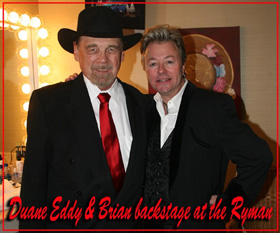
DE: Oh yeah, they’ve got a lot of people. They’ve got B.B.
King, they’ve got Joe Perry, just a whole bunch. They had Chet
Atkins but he died, so.
RS: So the Gibson Duane Eddy can help guitarists who play it get that
classic Duane Eddy guitar sound?
DE: Yes, they should be able to do it with this Duane Eddy Gibson.
I still love my old Gretsch. I bought one in ‘57, cut all my
hit records on it. Hard to beat that sound you know? In fact, that’s
what were trying to get with the Gibson. In the getting with it, that’s
what we based it on, was that whole sound. It had to be able to do
that, so we kept the single coil pickups and the big hollow body.
We tried a brass nut for a while but decided I didn’t care for
that as much. I haven’t really come up with any use for the third
pickup under the bridge. But I bet I will if I do any stage work.
I think it could come in handy. I did a show with Brian Setzer here
last December, it was his Christmas show. I went up and played “Peter
Gunn” on it with him and his orchestra. And I used the Gibson
in it. It cut right through! Great. If I’d have thought of it
I’d have thrown on that third pickup, but I didn’t think
of it till later! (laughter) I’m so not used to having it. It
would have cut through even better. So I’ll think of a use for
it, I haven’t yet. It’s a great guitar.
RS: Do you still have your original ‘57 red Gretsch?
DE: I do.
RS: That’s a world renowned guitar.
DE: Yeah, it is. And it still works and still looks great and plays
great. I still use it on a couple tracks on this album, this new album.
Before I got my Gibson and now I’m starting to use that and it’s
workin out great.
RS: I hope somebody’s smart enough to put out your new album...
DE: Well, we think we’ll figure out a way. We’ve got time
yet ‘cause we’re still working on it. We’ve got about
five or six tracks that are pretty far along and about done. I told
you about doing the Brian Setzer track. And the Phil Everly Brothers...are
you familiar with them?
RS: They were the first pop duo, years before Simon & Garfunkel...The
Everly’s were the prototype.
DE: That’s right, they were! And even Simon & Garfunkel would
be the first to tell you that. In fact, they had them come out on
tour with them a couple years ago. They said, ‘You want to know
where we came from? This is it, The Everly Brothers.’ And the
Everlys came out and did four songs on the show. Worked just great
for them, they loved doing it. Of course, Simon & Garfunkel are
still just as great as ever and so were the Everlys, so it was a heck
of show. Anyway, Phil’s been a friend of mine, well they both
have since 1958. I met them on an Alan Freed show in New York. I even
produced, when they broke up they both started recording separately
and I produced Phil’s first solo album for RCA. I’ve been
closer to him than Don actually. Phil’s the harmony singer. He’s
the one who sings the high part. Not that it matters, I mean you can’t
tell ‘em apart sometimes. It’s so close, the harmonies.
He’s one of the greatest harmony singers ever. Anyway, so we
wrote a song here a couple years ago and made a demo of it and then
we took that and recorded it for this album. And he’s singing
it great. A very pretty song. I’m Duane and he’s singing
so...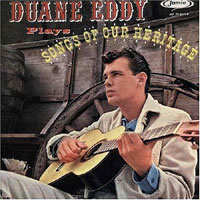
RS: Still be great to have you and Hank do something on your new album.
I’m sure you guys could do something pretty cool...
DE: We might think of something, yeah. (laughter) In between the two
of us we ought to be able to come up with some idea that works nicely.
If they’re interested, that would be fine. I’m interested.
I don’t have any big budgets or anything. Hank didn’t either
when we did “Pipeline” so, same situation.
RS: When is there going to be a Duane Eddy movie complete with video
and music soundtrack? It would be a fascinating story, not only for
guitar players and music lovers but in general for anyone interested
in iconic American pop culture heroes.
DE: Yeah, well I’m working on a book. So I’m just writing
down all my little adventures and how it all started and how it happened
and what we did and everything. Well I haven’t worked on it much
lately. I work on it a while and then I get sick of me. (laughter)
I just get tired of me and writing down my stories. But I’m working
on it and once that’s done...it may all just come together this
next year. I’ll give it to a publisher and let them edit it and
rewrite what needs to be done and so forth and make it into a readable
book. It’ll be a story of how rock and roll started and how my
part of it did anyway.
RS: Clapton’s book is doing well and you might have been more
important than Clapton in some ways as far kick starting that whole
guitar instrumental thing as well as giving rock and roll a new kind
of sensibility, production wise.
DE: I was taking it in a different direction, that’s right. But
it was all part and parcel of the same thing. Elvis started it all
and we all jumped in there from ‘55 on. First Elvis, then came
Chuck Berry and Little Richard, The Everly Brothers and Sam Cooke,
Bobby Darin and myself. Just a whole bunch of people. My thing is
a little different because it's instrumental and I got just as many
hits as some of the big singers or most of ‘em. I had 28 chart
records. A few have had many more, a few more.
RS: The guitar influence was probably more profound with you...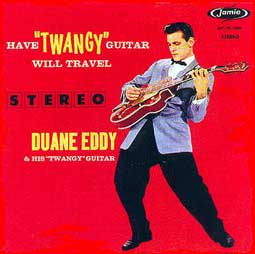
DE: Yeah, the guitar sound has kind of been adopted by anybody who
wants to do a western now. It’s been used in themes. The first
one was “Bonanza” they used that sound. They say, Morricone,
they always say that’s based on my sound. His stuff, his spaghetti
westerns.
RS: Anything you’d like to add? I mean the Grateful Dead said
what a long strange trip it’s been, but in your case...
DE: It’s still an ongoing journey, (laughter) in my case. I’ve
done some things...I did Broken Arrow, a movie with John Travolta
in ‘98, working with Hans Zimmer. He’s the biggest soundtrack
guy. He did Driving Miss Daisy, he did Red October, he
did any big movie you want to name practically, he did the music for
it.
RS: Did Broken Arrow come out on CD?
DE: Yeah, it’s out on CD and DVD rather. In fact, people liked
it so much, they called Hans up and bought the part that I’m
on to put on Scream 3 as one of the guy’s themes. So we’re
still clicking along here.
RS: Let me know if you need a big mouth New Yorker to help with your
new album, I’d love to help out.
DE: Well thanks Robert, I appreciate that. I might take you up on
that, you never know! I might think of something and I need somebody,
some big mouth New Yorker to shell out the word or put a bug in somebody’s
ear. You never know. Talk to you soon, I’ll be on the email to
ya. All right Robert, take care.
Thanks to Duane and Deed Eddy.
